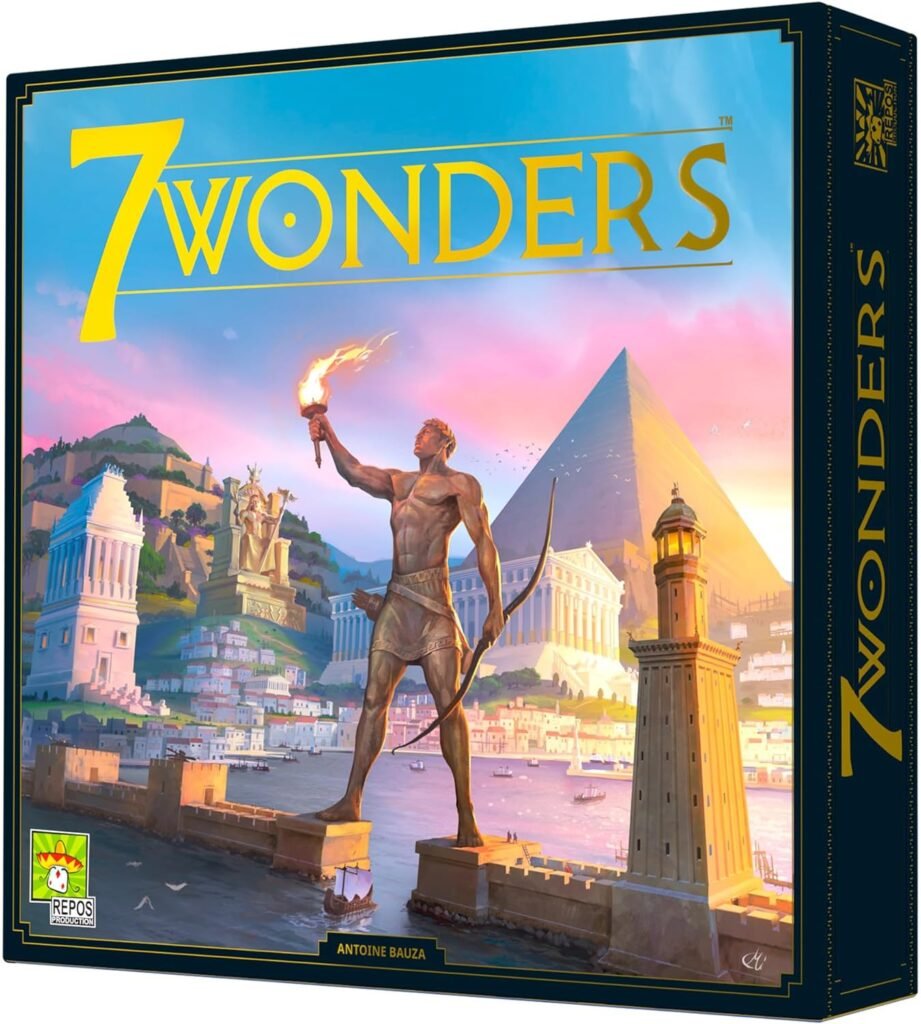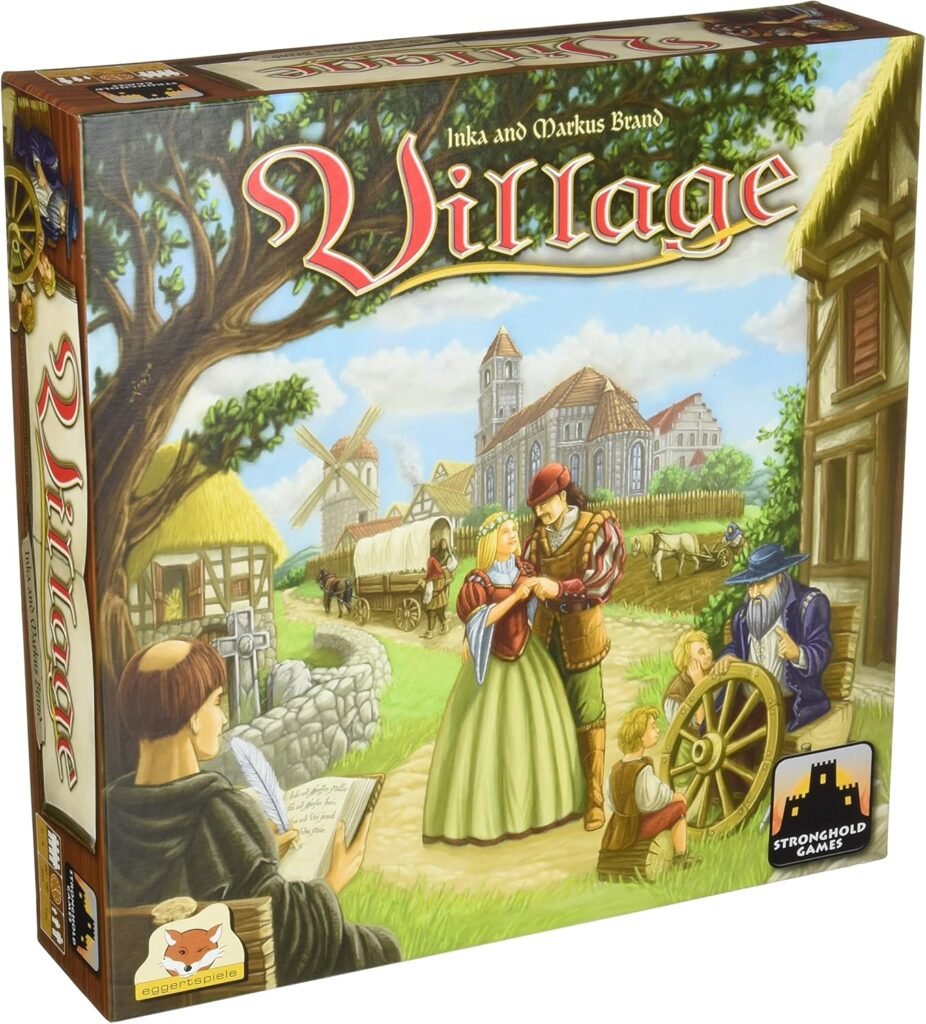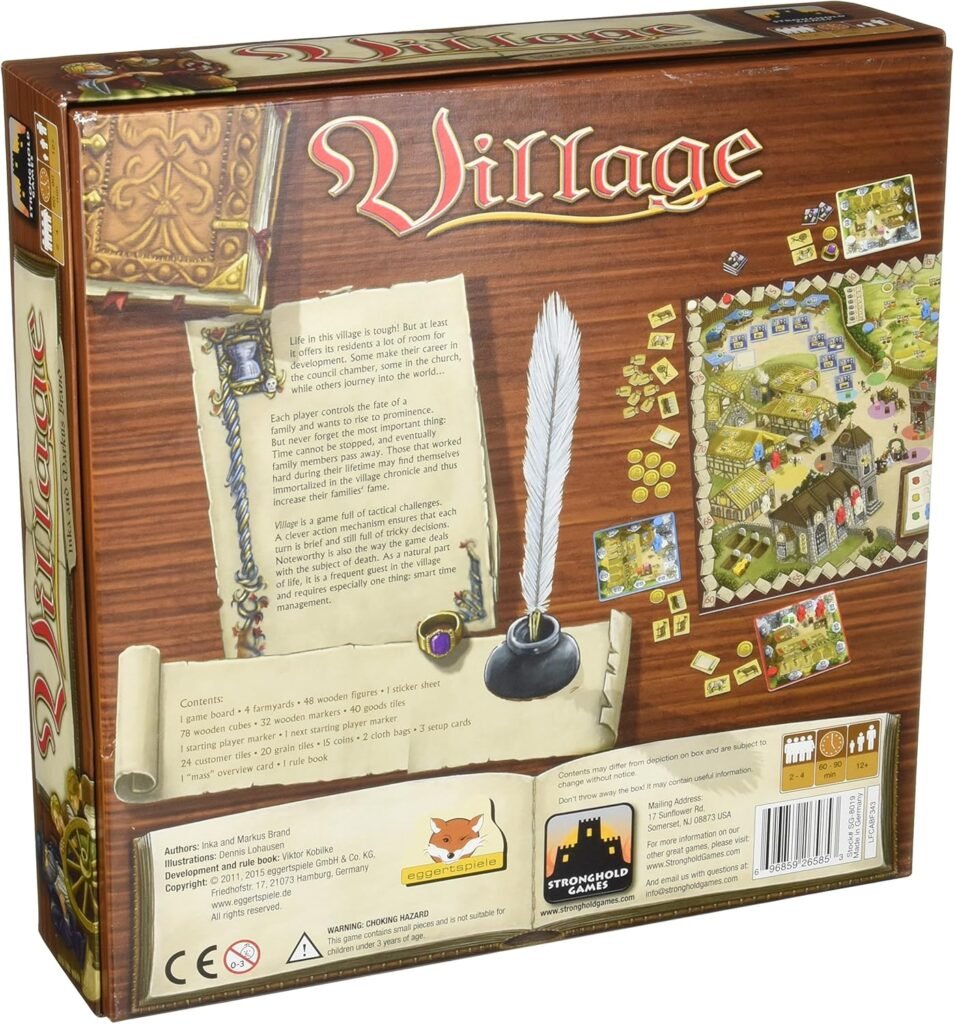
Introduction to the Kennerspiel Showdown
Alright, folks, gather ’round the table because we’re about to embark on a Kennerspiel des Jahres showdown for the ages. In this corner, we have the 2011 champion, 7 Wonders, a game that’s as flashy and engaging as that viral cat video you can’t stop watching. And in the other corner, representing 2012, is Village, the deep strategy game that makes you feel like you’ve got an honorary degree in medieval town planning.
So what’s the deal with these two titans of the German board game world? Well, 7 Wonders is like the board game version of speed dating. Quick rounds, lots of interaction, and a variety of strategies to keep things interesting. On the other hand, Village feels like a commitment. It’s a game where you invest time, emotions, and, let’s be honest, a bit of your soul, into seeing your little family flourish—or not.
I’ve logged plenty of hours with both, and each brings something unique to the table. With 7 Wonders, you’ve got that instant gratification—no hour-long rulebook readings required. Just draft, build, and conquer. Perfect for those nights when you want to feel like a strategic mastermind but only have the attention span for a 30-minute game.
Then you have Village, the game that takes you on an epic journey through generations. Imagine managing your resources, planning for the future, and feeling slightly guilty when your family members start kicking the bucket. It’s got a way of sucking you into its world, and before you know it, you’re emotionally invested in tiny wooden people.
But here’s a little joke to lighten the mood: Why do board games always get invited to parties? Because they know how to have a game night! 😄
So, fellow gamers, what’s your take? Are you all about the fast-paced excitement of 7 Wonders, or do you prefer the deep, strategic gameplay of Village? Spill the beans and share your game night tales in the comments!
The Allure of 7 Wonders

Let’s dive into 7 Wonders. This game is the cardboard version of that trendy cafe everyone raves about. With its engaging card-drafting mechanics, it hooks players faster than you can say “ancient civilizations.” You get to build your empire, compete with neighbors, and collect resources, all while feeling like a strategic genius. The cherry on top? Since 7 Wonders first hit the scene in 2010, it has sold over 1.5 million copies and been translated into 30 languages. Talk about a game with international appeal!
And let’s not forget about the speed of play. It’s like a quick power nap—refreshing and perfect for when you’ve got friends over and limited time. Whether you’re with hardcore gamers or your Aunt Sally who still thinks board games begin and end with Monopoly, 7 Wonders can fit the bill. There’s something immensely satisfying about pulling off a clever strategy in just 30 minutes.
Now, I have to mention the expansions. They are like the toppings on a sundae—optional but oh-so-sweet when you add them. Whether it’s Leaders, Cities, or Babel, each one brings new layers of strategy and fun. You could say they make the game “wonder-ful.” 😄
But, let’s be real. Not everything’s perfect in card-drafting paradise. For newcomers, the learning curve can feel steeper than a roller coaster. The first few rounds might feel like trying to decipher an ancient manuscript. Even seasoned players occasionally get lost in the shuffle, pondering if they accidentally signed up for a game of Sudoku instead.
So, how about a quick dad joke to lighten the mood? Why did the board game get promoted? Because it always played its cards right! 😆
What about you, fellow gamers? Do you find the fast-paced action of 7 Wonders irresistible, or does another game take the top spot on your shelf? Share your game night experiences and favorite strategies in the comments below. Let’s keep the board game chatter going!
The Complexity of Village

Ah, Village. If 7 Wonders is like a speed date, Village is the long-term relationship that actually works out. This game is a love letter to anyone who enjoys deep strategy, intricate planning, and the occasional existential crisis when one of your beloved family members bites the dust. It’s like running your own medieval sitcom, complete with life, death, and a surprising amount of farming.
What sets Village apart is its worker placement and life cycle system. You’re not just plopping down workers; you’re managing their entire lives, from youthful vigor to inevitable demise. And let’s be real, there’s something darkly amusing about planning a family reunion in the graveyard.
The theme is as thick as your grandma’s homemade gravy, immersing you in a world where every decision can ripple through generations. There’s a certain grim satisfaction in knowing you’ve planned your little cardboard family’s lives better than your own. It’s almost therapeutic—until you realize you’ve grown emotionally attached to a piece of wood with a painted face.
But Village isn’t all smooth sailing. Setting up can be a marathon of tiny pieces, rule-checking, and possibly questioning your life choices. It’s the kind of game that might make you wish you’d become a monk for the simpler life.
Oh, and here’s a little dad joke to lighten the mood: Why did the board game go to therapy? It had too many unresolved issues!
So, fellow gamers, what’s your take on Village? Do you find the multi-generational gameplay as engaging as I do, or does the setup make you want to flip the table? How do you manage your emotional investment in those tiny wooden family members? Share your stories and strategies in the comments!
7 Wonders: Strengths and Weaknesses

Alright, let’s get into the nitty-gritty of 7 Wonders. First off, the replayability is absolutely stellar. Every game feels fresh, and with so many different strategies to explore, you’ll never get bored. Plus, those expansions are like the cherry on top, adding new layers and keeping things spicy.
But let’s talk about the elephant in the room—the learning curve. If you’re new, diving into 7 Wonders might feel like trying to solve a Rubik’s Cube in the dark. The rules can be a bit overwhelming initially, especially when you’re trying to draft, build, and score all at once. I’ve seen many a newbie with that “deer in headlights” look during their first game.
However, once you get past that initial brain strain, it’s smooth sailing. The game’s speed is a massive plus—30 minutes and you’re done! This makes it perfect for those nights when you want a quick strategic fix without sacrificing depth.
And speaking of strategy, 7 Wonders really makes you feel like a genius when your plans come together. There’s nothing quite like outsmarting your friends and watching your empire flourish while theirs crumble. It’s like being the Einstein of the ancient world!
Oh, and here’s a little humor to lighten the mood: Why don’t board games ever get lost? Because they always have a lot of direction! 😆
So, fellow gamers, what’s your take on 7 Wonders? Do you find the fast-paced action irresistible, or does the learning curve make you want to flip the table? And what’s your go-to strategy when you play? Let’s hear your thoughts and game night stories in the comments below!
Village: Advantages and Disadvantages

Now, onto the marvels of Village. One of its biggest strengths is the theme integration. You really feel like you’re navigating through life in a quaint medieval town, complete with the joys of strategic depth. It’s a game where your decisions ripple through generations, making it feel like you’re playing SimLife: The Board Game.
But it’s not all sunshine and roses. Setting up Village can be a bit of a marathon. It’s the kind of process that requires dedication, patience, and possibly a snack break. For those who prefer instant gratification, Village might seem like it’s in a different time zone.
Now, let’s talk about the gameplay. Village isn’t just about placing workers—it’s about guiding their entire lives. You start to care about these tiny wooden figures more than you care about your real-life to-do list. And that graveyard? It’s both a point-scoring opportunity and a place for a tiny wooden eulogy. There’s a strange satisfaction in seeing your family tree grow, even if it’s made out of wood and cardboard.
But I won’t sugarcoat it—getting into Village can feel like you’re studying for finals. The rules are intricate, and you might need a PhD in Medieval Studies to grasp it all on the first go. But once you get it, it’s a rewarding experience, kind of like finally getting your stubborn dog to sit.
And here’s a little dad joke to lighten the mood: Why did the board game go to school? To improve its board sense! 😆
So, fellow gamers, what’s your take on Village? Do you find the multi-generational gameplay as engaging as I do, or does the setup make you want to flip the table? How do you manage your emotional investment in those tiny wooden family members? Share your stories and strategies in the comments!
Picking the Champion
Alright, let’s get down to brass tacks. After countless nights spent battling it out with 7 Wonders and nurturing wooden families in Village, I’ve got some thoughts. If you’re the type who loves a quick, satisfying game that makes you feel like a genius without the commitment, 7 Wonders is your go-to. It’s like the fast food of German style board games—quick, tasty, and always leaves you wanting more.
But, if you’re someone who enjoys savoring every moment and relishes in-depth strategy, Village is your jam. There’s something uniquely fulfilling about seeing your plans come to fruition over multiple generations, even if it means a bit more setup time and rule-checking.
For those casual game nights when you want to engage everyone at the table, 7 Wonders wins hands down. It’s easy to get into, quick to play, and has that universal appeal. But for those weekends when you’re in the mood to dive deep and really flex your strategic muscles, Village is the clear choice. It’s like a fine wine—best enjoyed slowly and with good company.
Now, here’s a little humor to keep things light: Why don’t board games ever get tired? Because they always keep playing around!
So, what’s your take, fellow gamers? Do you lean towards the quick, thrilling world of 7 Wonders, or do you prefer the multi-generational saga that Village offers? How do you decide which game to bring out on game night? Let’s get the conversation rolling! Share your epic wins, hilarious losses, and favorite strategies in the comments below.
The Concluding Verdict with a Touch of Humor
Alright, folks, after countless hours of drafting cards in 7 Wonders and nurturing tiny wooden families in Village, it’s decision time. Both games have their unique charms, but if I have to choose, I’d say 7 Wonders takes the crown. Its quick pace and universal appeal make it a game night favorite, perfect for those times when you want a strategic fix without a PhD in medieval studies.
That said, Village is like a fine wine—it’s for those who love to savor every strategic decision and watch their plans unfold over generations. It’s deeply satisfying in a way that only a multi-generational family saga can be. If you’ve got the time and the patience, Village offers an experience that’s hard to beat.
But for sheer accessibility and replayability, 7 Wonders wins by a narrow margin. It’s the game that gets everyone at the table, from hardcore gamers to your Aunt Sally, and keeps them coming back for more.
And now, for a touch of humor: Why did the board game go to the therapist? It had too many unresolved issues! 😄
So, fellow gamers, what’s your verdict? Are you enchanted by the quick thrills of 7 Wonders, or do you prefer the deep, generational strategy of Village? Do you have any epic game night stories or strategies to share? And most importantly, what’s your favorite board game snack? Let’s keep the conversation going in the comments below!
